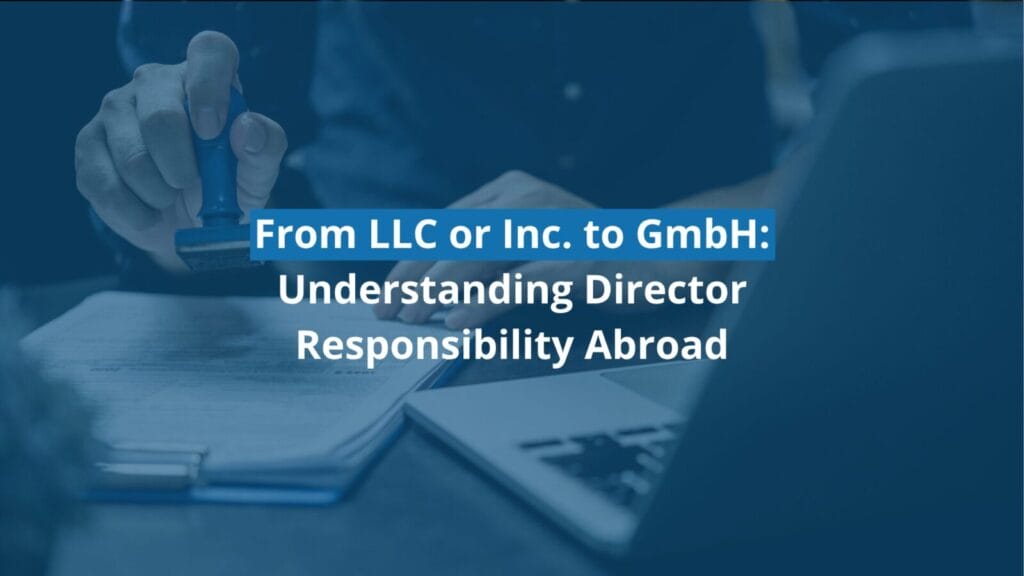Understanding the Role of a Managing Director in Germany
In Germany, the managing director (Geschäftsführer) holds a pivotal role in the legal and operational structure of a limited liability company such as a GmbH or UG. Unlike the more flexible corporate officer structures found in U.S. Corporations or LLCs, managing directors in Germany are bound by well-defined statutory duties and are subject to a high standard of personal liability.
German entities like a GmbH or UG have their own frameworks; understanding the types of companies in Germany will provide context for the liability rules discussed here.
Legal Obligations and Duties
Managing directors in Germany are obligated to adhere to a wide range of statutory responsibilities, including but not limited to:
- Maintaining proper accounting records
- Filing annual financial statements with the Federal Gazette (Bundesanzeiger)
- Overseeing tax and social security compliance and timely submissions of related filings
- Acting in the best interest of the company while avoiding conflicts of interest
Failure to fulfill these duties can result not only in civil liability but also in criminal prosecution in certain cases, including for delayed insolvency filings or misrepresentations in financial disclosures, and to being barred from assuming managing director roles in the future.
Comparison to U.S. Officer Liability
In the U.S., the personal liability of executives or officers in an LLC or Corporation is generally more limited. U.S. companies often use contracts and internal governance documents to further shield officers from personal liability. Moreover, the U.S. market offers a broader set of insurance products to enhance this protection.
In contrast, German company law provides fewer contractual levers to limit a director’s liability. German courts are also known to apply a stricter standard when assessing director conduct, especially during times of financial distress or insolvency risk.
This contrast highlights the key differences between German and U.S. companies, detailed further in our comparison of GmbH vs. U.S. LLC/Inc structures.
Financial Disclosure and Transparency Requirements
From a US perspective, an often-overlooked obligation for managing directors of German limited companies is the requirement to prepare and publicly file financial statements annually, even for private companies. These documents, depending on the size of the company, may require auditing and must be filed publicly via the Bundesanzeiger.
This level of mandatory transparency is markedly different from U.S. private entities, which are typically not required to publicly disclose financial records unless they are listed or fall under specific regulatory scrutiny rules.
Director and Officer Insurance (D&O) in Germany
One important safeguard is D&O insurance, which is available in the German market, albeit often less robust than in the U.S. It is strongly recommended for any U.S. executive taking a management role in a German entity to engage a local expert and ensure adequate D&O coverage is in place.
When obtaining such insurance, considerations should include:
- Coverage limits tailored to the company’s operations and size
- Insolvency coverage, which can be crucial due to stricter insolvency filing requirements
- Defense costs coverage including legal fees in case of civil or criminal proceedings
Minimizing Liability: Best Practices
To manage liability risk under German law, executives should:
- Regularly review financial status and solvency of the company
- Document all board decisions and risk management processes
- Engage legal and tax advisors familiar with German company and tax laws and other compliance requirements
- Ensure timely and accurate compliance with tax filing and other legal obligations
Conclusion
For U.S. executives managing or planning to manage German entities such as a GmbH or UG, understanding the stricter framework of personal liability is essential. While the German market offers strong commercial opportunities, these come with increased governance expectations. By recognizing and responding to these differences—with appropriate legal advice, insurance coverage, and internal processes—directors can protect themselves while contributing to a company’s success in Germany.
For executives planning their first EU expansion, our “Are You Ready for Europe?” tool can quickly highlight whether your business is fully prepared for the German market.
